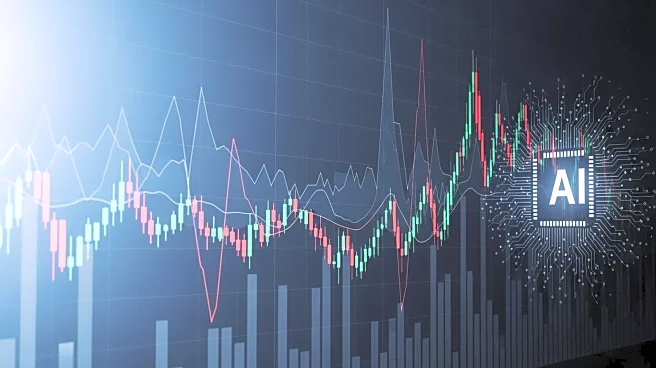What's Happening?
Jim Cramer, a prominent financial analyst, has expressed concerns over the current state of the U.S. stock market, attributing the decline to two major factors: the ongoing government shutdown and fears
surrounding the rapid expansion of artificial intelligence. The government shutdown, now in its 37th day, is the longest in U.S. history, leaving hundreds of thousands of federal employees furloughed or working without pay. This situation has delayed the release of crucial economic data, leaving investors uncertain about the economy's health. Additionally, Cramer pointed out the growing influence of AI and data centers, which he described as a 'blob' engulfing various sectors of the economy. This expansion is fueled by significant investments from companies like OpenAI, raising concerns among investors about the potential need for government intervention.
Why It's Important?
The prolonged government shutdown and AI expansion are creating significant uncertainty in the U.S. financial markets. The lack of official economic data due to the shutdown hampers investors' ability to make informed decisions, potentially leading to increased market volatility. Furthermore, the rapid growth of AI technologies and data centers could disrupt traditional industries, affecting employment and economic stability. Companies investing heavily in AI may face scrutiny over their influence on the economy, and the potential need for government intervention could lead to regulatory changes. These factors combined could have long-term implications for U.S. economic policy and market dynamics.
What's Next?
As the government shutdown continues, pressure mounts on political leaders to reach a resolution and restore normal operations. The release of delayed economic data will be crucial for investors seeking clarity on the market's direction. Meanwhile, the expansion of AI technologies will likely prompt discussions among policymakers regarding regulation and oversight to ensure balanced growth. Stakeholders in the tech industry may need to address concerns about their impact on the economy and explore sustainable practices. The market will be closely watching developments in both areas, as they could significantly influence future investment strategies and economic policies.
Beyond the Headlines
The intersection of government policy and technological advancement raises ethical and regulatory questions. The potential for AI to reshape industries and labor markets could lead to debates about the role of technology in society and the need for protective measures for affected workers. Additionally, the government's involvement in supporting or regulating AI growth may set precedents for future technological innovations. These discussions could influence public perception of AI and government intervention, shaping cultural attitudes towards technology and governance.









